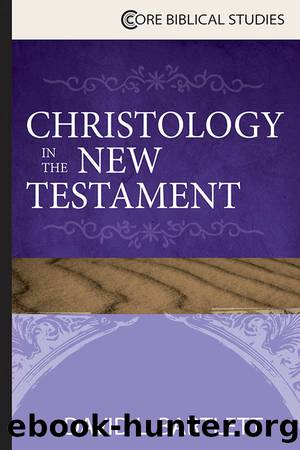Christology in the New Testament by Bartlett David L.;

Author:Bartlett, David L.;
Language: eng
Format: epub
Publisher: Abingdon Press
Published: 2017-08-15T00:00:00+00:00
What Happens When We Die? 1 Corinthians 15
For the most part, in reading Paulâs letters to various churches, we get only his side of the conversation. When he writes 1 Corinthians, however, Paul gives us important information about what the Corinthians are asking him.
He has two sources of information about the church at Corinth. The Corinthian believers have sent him a letter filled with questions, and often he quotes these questions before answering them. And a delegation from the church, designated as âChloeâs people,â has come in person bringing further information about the congregation and raising further questions.
The last of the issues that Paul addresses directly in this letter is raised in 1 Corinthians 15:12: âNow if Christ is proclaimed as raised from the dead, how can some of you say that there is no resurrection of the dead?â The claim some Corinthians are making seems straightforward enough: â[There is] no resurrection of the dead.â However, in fact, there are at least three ways of understanding their claim, and some scholars have defended each one of these.
The interpretation that seems most obvious to us, perhaps because it is most prevalent in our own time, is simply this: when we die, we die, and that is the end of it. No heaven, no afterlife, no resurrection to a new existence. We are remembered for as long as there are people to remember us, and then nothing. This sounds like the kind of belief of the Corinthians Paul quotes in 15:32: âletâs eat and drink because tomorrow weâll die.â
A second interpretation reminds us that in the first century, as now, there were many people who believed that the human being was divided into a body and a soul. When we die, they claimed, the body decays but the soul remains. Then, as now, there are many different theories about what happens to the soul, but then as now the belief in immortality depended on a distinction between the material body and the spiritual soul. But those who believe in the immortality of the soul donât really believe in the resurrection from the dead, which involves the whole person, not just the soul.
A third interpretation relies very much on a reading of the first chapters of 1 Corinthians. At some points in that letter it looks as though the mistake Paul believes the Corinthians are making is that they think they have something very like eternal life right now: âAlready you have all you want! Already you have become rich! Apart from us you rule; indeed I wish that you did rule, so that we might rule with youâ (1 Cor 4:8 AT). These interpreters claim that the Corinthians believe what the Gospel of John sometimes seems to claim: that eternal life is right now, and the faithful do not need to wait for some kind of future consummation.
Whatever the exact mistake Paul thinks the Corinthians are making, his response involves a particular interpretation of Jesusâs life, death, and resurrection, and of what
Download
This site does not store any files on its server. We only index and link to content provided by other sites. Please contact the content providers to delete copyright contents if any and email us, we'll remove relevant links or contents immediately.
Fangirl by Rainbow Rowell(8506)
How to Bang a Billionaire by Alexis Hall(7770)
Wonder by R. J. Palacio(7493)
The Space Between by Michelle L. Teichman(6426)
The Thirst by Nesbo Jo(6249)
Assassin’s Fate by Robin Hobb(5646)
Wiseguy by Nicholas Pileggi(5059)
The Night Circus by Erin Morgenstern(4821)
The Kite Runner by Khaled Hosseini(4812)
Bittersweet (True North #1) by Sarina Bowen(4590)
Paper Towns by Green John(4586)
Gerald's Game by Stephen King(4229)
Too Much and Not the Mood by Durga Chew-Bose(3953)
Pillow Thoughts by Courtney Peppernell(3837)
Goodbye Paradise(3279)
Twelve Days of Christmas by Debbie Macomber(3276)
Good by S. Walden(3186)
The Rosie Effect by Graeme Simsion(3035)
The Cellar by Natasha Preston(2933)
